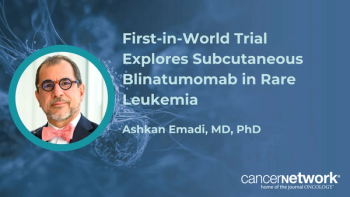
Oncology NEWS International
- Oncology NEWS International Vol 17 No 5
- Volume 17
- Issue 5
NCCN greenlights nilotinib for imatinib-resistant CML patients
The NCCN has added nilotinib to its practice guideline for CML for use after any imatinib failure point in the chronic phase of disease.
The National Comprehensive Cancer Network has added nilotinib (Tasigna) to its practice guideline for the management of chronic myelogenous leukemia. NCCN CML panel members recommend that the tyrosine kinase inhibitor be considered after any imatinib (Gleevec) failure point in the chronic phase of disease. The NCCN panel also suggested that the drug be considered during accelerated phase or post-hematopoietic stem cell transplantation (HSCT), but emphasized that it should not be used during blast crisis.
Tasigna was approved by the FDA in October 2007 for the treatment of chronic-phase and accelerated-phase Ph+ CML in adult patients resistant to or intolerant of prior treatment that included imatinib.
Nilotinib is active against 32 of the 33 BCR-ABL mutations that are most commonly associated with imatinib resistance, according to Novartis, manufacturer of Tasigna and Gleevec.
The updated NCCN guideline (
• For CML patients after 3-month evaluation, nilotinib is advised for hematologic relapse but not for hematologic remission. After the 6-month evaluation, it may be used for patients with no cytogenetic response or cytogenetic relapse.
• For CML patients after 12-month evaluation, nilotinib is suggested for patients with no cytogenetic response or cytogenetic relapse; at 18 months, for patients with a partial, minor, or no cytogenetic response or cytogenetic relapse.
• For CML patients after HSCT, nilotinib is added as a treatment option for patients who are not in remission, or who are in relapse with graft-vs-host disease (GVHD), or in relapse with no GVHD and no complete cytogenetic response or PCR-positive after a complete cytogenetic response.
• For CML patients with disease progression on imatinib therapy, nilotinib is added as a treatment recommendation for patients in accelerated phase.
Based on multiple studies
The NCCN guideline was crafted based on multiple studies that assessed nilotinib in CML, including a major dose-escalation trial (N Engl J Med 354:2542-2551, 2006). In the second phase of that study, nilotinib 400 mg was administered orally twice daily to 280 patients with Ph+ CML in chronic phase after imatinib failure or intolerance. Patients had at least 6 months of follow-up.
According to the results, the estimated survival at 12 months was 95%, and adverse events were mostly mild to moderate (Blood 110:3540-3546, 2007). [See story above for updated results of the trial with 11-month follow-up.]
Articles in this issue
almost 18 years ago
Immunotherapy agent promising in NSCLCalmost 18 years ago
No overall survival benefit for dose-intense regimen in SCLCalmost 18 years ago
Make a note of new smoking cessation codesalmost 18 years ago
Relistor for treating OICalmost 18 years ago
Experts argue against need for phase III proton Rx trialsalmost 18 years ago
Spotlight on Cancer Centersalmost 18 years ago
Novel peptide vaccine promising in myeloid leukemiaalmost 18 years ago
Masters of hematology and oncology: Father of tamoxifen a Brit to the corealmost 18 years ago
Intensive imatinib/chemo ups EFS in pediatric Ph+ ALLalmost 18 years ago
Relapsing DLBCL patients respond to rituximab-based RxNewsletter
Stay up to date on recent advances in the multidisciplinary approach to cancer.














































